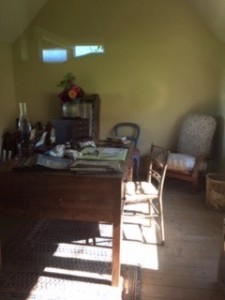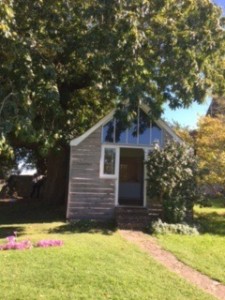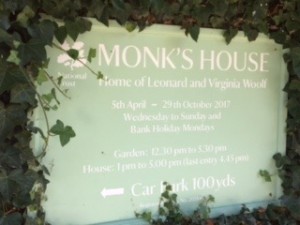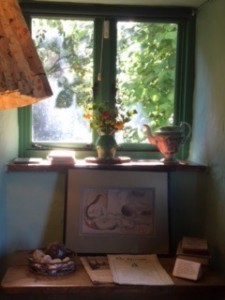
 ”
”
Tomorrow I shall smell a red rose, gently surge along the lawn, light a cigarette, take my writing board on my knee and let myself down, like a diver, very cautiously into the last sentence I wrote yesterday”.
Autumn equinox in the ‘season of mists and mellow fruitfulness’. These days a walk in the park with my grandchildren means collecting acorns and looking for conkers.
We take a drive through the South Downs, and its rolling gentle waves of meadows backgrounded by the stunning white cliffs.
Coming from Australia with our bright sunlight, the soft blues and greens are palpable.
Yes we are in East Sussex, England. Our beautiful Aussie-English-Welsh family, our gorgeous eldest daughter Elizabeth and her husband William and our two darling grandchildren, Thomas Llewellyn and Eleanor Therese live in Burgess Hill, not far north of today’s adventure.
We pass through the busy tourist destination of Lewes, famous for its Castle and ruined Priory, through narrow streets of stone terrace houses then down a winding narrow lane to the National Trust sign.
Our destination is Virginia Woolf’s house where she did most of her writing. It is a secluded 18th century cottage called Monk’s House in the village of Rodmell. She and her husband Leonard a famous editor bought it in 1919.
It is not a large house but what a surprise it was to enter the gate and find nearly an acre of gardens, flower beds and lotus ponds that reflect the larger trees and people strolling in the grounds. Further in, is a massive vegetable garden, and orchard and at the back of the orchard a small summer house where Virginia Woolf did most of her writing. It is still set up with her desk and typewriter as if she has just finished writing ‘To the Lighthouse’ and has gone for a stroll on the Downs.
Many famous people including TS Eliot, Vanessa Bell and Roger Fry visited during the summer and sat out under the massive chestnut trees next to the orchard and chattered about all things writing and painting. One can just imagine the tennis match, the clink of bowls played on the green, the walks out on the downs, the lazy hazy afternoons as Virginia wrote once “our orchard is the very place to sit and chat in for hours”
Imagine the chatter about the colours that they were choosing to paint the walls, the greens, antique rose, and elderberry.
‘The Bloomsbury Movement’ flourished here, famous for its combination of bright colours, bold patterns and eclectic objects. In the house it paintings, soft coverings and pottery created an atmosphere of comfit and informality..
At one stage Virginia hand painted paper to cover her Collection of Shakespeare books. Today this collection is book-cased in her bedroom. and the pattern is printed on scarves and other mementos.
Finally the stone garden walls are a feature. One especially features the busts of both Virginia and Leonard, their sacred memory, where their ashes were originally buried.
We came away relaxed and inspired. There is a beauty and a presence there that is overwhelming. The people who rambled through, or perhaps sat meditatively around the grounds helped radiate the quiet beauty that reflects the personalities of its former owners Virginia and Leonard Woolf .


